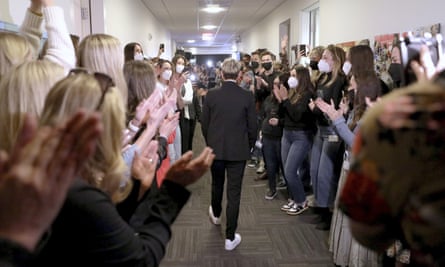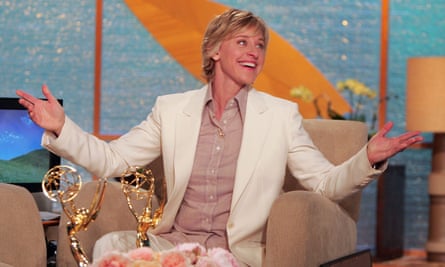With tear-stained cheeks, Ellen DeGeneres signed off her chatshow for the final time on Thursday, ending a daytime TV juggernaut that had lasted 19 years.
The guest list for the final show included Billie Eilish, Pink and Jennifer Aniston, making her 20th appearance – a run that dates back to the syndicated chatshow’s debut. It also saw DeGeneres’s brother, Vance, and her wife, Portia de Rossi, well with emotion as the audience gave the 64-year-old host one last standing ovation.
There’s no doubt DeGeneres leaves a massive hole in daytime lineups, with her small-screen crown now left for Drew Barrymore and Kelly Clarkson to fight over. But the legacy her show leaves behind is mixed. It was a risky move that took the brilliant comedian, whose soaring career stalled after she came out as gay, and remade her as the undisputed queen of daytime TV. But the show was dogged by scandal in recent seasons, as former employees accused her of presiding over a toxic workplace. And though DeGeneres did publicly apologise and vowed to change the corporate culture of her show, the damage was done. Amid fizzling ratings, DeGeneres announced last May that this would be her final season.

In the 1980s, you would have been hard pressed to name another female comic besides Roseanne Barr who had as much heat as the Louisiana-born DeGeneres, whose personable, observational style had many calling her the “female Seinfeld”. In her maiden appearance on the Tonight Show in 1986 a mulleted DeGeneres cracked up the crowd with family stories delivered with the most efficient language, in the driest tone. And the jokes were often at her expense. (“My parents were extremely cruel to me,” she joked. “I remember, I was coming home from kindergarten … Well, they told me it was kindergarten. I found out later I’d been working a factory for two years.”) After her five-minute set, host Johnny Carson waved her over to the open seat next to him, the ultimate stamp of approval, and told her she was welcome back any time.
After that anointing, DeGeneres’s career followed the classic star-making blueprint of that decade. First came the headlining club gigs, then coveted spots on high-profile TV comedy specials, then cameos in Coneheads and other slapstick films. Finally in 1994 ABC built a sitcom around her called Ellen, about a neurotic LA bookstore owner, that also featured a pre-Entourage Jeremy Piven. The show was a ratings hit and a critical darling that earned DeGeneres three Emmy nominations. In 1997, at the height of her pre-daytime popularity, DeGeneres came out as a lesbian to Time magazine and on the Oprah Winfrey Show; then on DeGeneres’s own sitcom, her character came out – to a therapist played by Winfrey, and to a love interest played by Laura Dern.
The sitcom revelation, the first of its kind on network TV, put to rest years of audience speculation and network suspicion about Ellen’s on-screen character. The show title – the Puppy Episode, chosen expressly to throw off the scent – indeed wound up surprising 42 million viewers, the most ever for the series. The episode was celebrated in the LBGTQ+ community, but was also the focus of immense backlash.
JCPenney and Chrysler were among the biggest sponsors to pull ads. Jerry Falwell christened DeGeneres “Ellen DeGenerate” and joined other prominent rightwingers in a public letter denouncing the episode. One group ran a full-page advert in Variety charging ABC with promoting homosexuality. In a 2019 interview, Dern recalled cops sweeping the soundstage for bombs during rehearsals and said she struggled to find work for almost a year afterward. DeGeneres herself was subject to death threats. Even Anne Heche, the actor who had a very public relationship and breakup with DeGeneres during that time, suffered collateral damage.

After the puppy episode, the show was backed for another season, albeit with parental advisory warnings as ABC tried to walk the line between appeasing critics and supporting DeGeneres, who doubled down and kissed a female co-star in another landmark episode. But ultimately the middle ground caved in. In 1998, a year after DeGeneres came out, Ellen was cancelled – a decision, she said, that caught her blindsided. She rebounded at CBS with the Ellen Show (another series in which she played a lesbian) only to wind up canceled after 18 episodes, five of them unaired. In 2007, a former writer’s assistant accused her of treating writers on the Ellen Show “like shit”, a theme that would revisit her in the end.
Even though much of the country had come around to DeGeneres’s sexuality – in large part thanks to her paving the way for Will & Grace, Ugly Betty and other shows that made it normal to see gay characters on sitcoms – it seemed as if she might settle for a relatively smaller career as a touring comedian and Glaad ambassador.
But then two years later she resurfaced with the Warner Bros-produced Ellen DeGeneres Show, a daytime chatshowthat launched at a time when Sharon Osborne and Rita Rudner were vying to become the next Winfrey. DeGeneres, an out gay woman, hardly looked the favorite. But she proved to be a hit out of the box – winning over skeptical middle Americans with her happy feet and relentless self-deprecation. In year one, the show was nominated for 11 daytime Emmys and won for best talkshow. And when Winfrey signed off from her chatshow in 2011, DeGeneres succeeded her on the daytime TV throne. Her silver screen comeback as Dory in Finding Nemo was confirmation of her obvious mainstream appeal.
For most of its 19 seasons the Ellen DeGeneres Show is where A-listers that were game for pranks and fun new products looking for placement would find a home. But near the end, DeGeneres appeared out of touch while interviewing rising stars. She also wasn’t above defending industry pals who courted controversy, or ashamed to attend NFL games seated next to noted warmonger George W Bush.
But it was her lack of rapport with show employees that ultimately brought about DeGeneres’s retirement. She was accused of fostering an environment rife with racist comments and other forms of harassment. Three executives left the show after a WarnerMedia investigation. But none of that stopped her from bringing Winfrey, Michelle Obama and Kim Kardashian out as guests in her final few months.
But just because the show is over doesn’t mean DeGeneres’s career can’t keep chugging along. In her 2018 Netflix comedy special, Relatable, DeGeneres showed she still has her standup chops, as well as good inroads with the streaming giant. She also showed her edgier side, that’s been mostly off our screens since the 80s, with jokes about her cosseting wealth and frustration at having to dance for fans. Without the weight of daytime TV on her shoulders, DeGeneres is free to be as nice or as mean as she likes.
